Table of Contents
- 1 10 book recommendations for students - Reading is always a power! A book-loving monk recommends great books!
- 1.1 1 Dale Carnegie, "Motivating People.
- 1.2 2 Amy E. Herman, "Masterpiece Reading to Improve Your Observational Skills."
- 1.3 3 Shigehiko Toyama, Organizing Thoughts
- 1.4 4 Hidenobu Kosai, Rhetoric and Sophistry.
- 1.5 5 Barbara N. Horowitz and Kathleen Bowers, WILDHOOD Wild Adolescence.
- 1.6 6 Hideo Kobayashi, On Reading
- 1.7 7 Reggie, "Fast Cultivation: People Who Want Answers in 10 Minutes."
- 1.8 8 Frankl, Night and Fog
- 1.9 9 HINO Madoka, "Composers' Stories Series" (now "Biographies of Musicians: A Book to Read at the Beginning" series)
- 1.10 10 Tadayen, Tannisho
- 2 Conclusion
10 book recommendations for students - Reading is always a power! A book-loving monk recommends great books!
In this article, "10 Books to Recommend to Students," we will introduce books that we highly recommend to students who are about to enter the workforce.
I decided to write this article precisely because of what I have felt in my own interactions with students since last year, 2023. I am currently a part-time lecturer at Hakodate Otani Junior College. I have been recommending books to my students, and it occurred to me that an article that summarizes these recommendations would be a great way to communicate them not only to the students in front of me, but also to students all over the country.
Up until junior high school or high school, students were told, "Let things be as they are, individuality is important, and everyone gets along with everyone else. Everyone should get along with each other," so to speak. (Even in this world, there are many harsh situations such as school caste and bullying.)
However, once you go out into the world, you will be faced with a much harsher world where no one will protect you.
'No, no, no, no, no, no, no, no, no, no, no, no, no, no, no, no, no, no, no, no, no, no.
Of course, that is true. However, I think it is true that there is a gap compared to the environment in junior high school and high school where one is protected by parents and society.
And in order to be in such an arena, one needs to have the skills to protect oneself and the mindset to fight in such an arena. Unfortunately, it is a fact that there is a world in which small techniques alone are not enough.
I dare say it sounds harsh, but the reality is not so sweet.
It is dangerous to take the word of a sparkling successful person who says, "Your dreams will come true. It is dangerous to believe them when they say, "You just have to live your life the way you do. We must also consider how talented, how privileged, and how hard the successful person has worked to achieve it (and there is also the fundamental question of whether it is really justified, even if it seems sparkly at first glance. (What if they were hurting someone or living by deceiving others?)
Oh, I can't do it if I think like that. Is it worth living in such a painful world? I hate it. It's hard.
I am sure that many of you have thought so.
But don't worry.
Whatever the world in which you live, you can choose how you see things and how you live. That is what it means to be an adult.
I have ventured to tell you about the harsh side of the world first. However, my purpose in doing so was not to scare you and make you feel depressed. I wanted you to first recognize your own situation and then think about what to do about it.
Becoming an adult means graduating from the passive world. It means choosing one's own path and accepting it as one's own life. It is true that one's life is greatly influenced by one's environment. However, that is not the only thing that affects human beings.
Being a student is an important period of preparation for changing into such an adult. What you learn and practice during this period will have a great impact on your future life.
Professional knowledge and abilities are also important, of course. It is also important for students to devote themselves to academics, sports, and social activities (and of course, to play to the fullest).
But apart from that, there are of course other things that are important for living as an adult and as a human being. In this article, we would like to introduce to you some books that we recommend that have great meaning for your life.
Let us begin with a brief introduction. This article will provide a brief introduction to the recommended books, but if you are interested, please refer to the links below for more detailed information about each book.
1 Dale CarnegieMoving People."
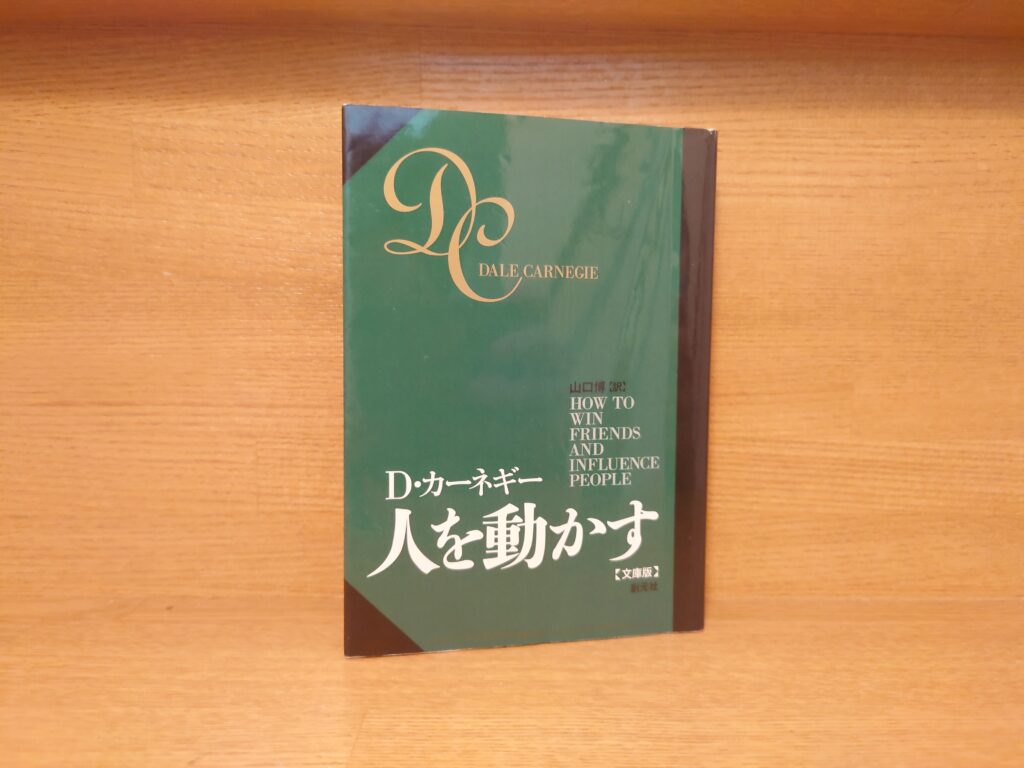
The first thing I want to talk about is.This book is underwhelmed by the book title.This is the point.
The title of the book, "Motivating People," gives a somewhat negative impression, as if one were trying to move others to do one's own bidding.
The original title of this book is "How to Win Friends and Influence People," which roughly translates to "How to Win Friends and Influence People. I can understand why the title "Win Friends and Influence People" was given to the book, but I think the title of the book might make some people wary that it is a self-serving, dubious self-help book. At the very least, I could not casually recommend this book to others. To be honest, I was afraid of what people would think of me if I introduced this book to them.
But this book is not one of those dubious things.
I first picked up this book during my junior year of college, when I was researching the relationship between self-help books and religion. At the time, I was reading a variety of books with the hypothesis that self-help books might be a distraction from Christianity and other religious doctrines.
That is when I came across this book.
This book is one of the classics among self-help books, and even then I started reading it with the thought that the book must also have a strong Christian influence, but as soon as I started reading it, I was struck by the depth of the book.
This book is not just...!"
Clearly, this is not like the dubious books that flood the world.
I was 21 years old at the time. I was still young and in a helpless period of my life when I was, shall we say, sharp.
However, reading this book made me reflect intensely on my own inadequacies. I blamed the world around me for things that didn't go well and looked at the world in a selfish way. I was arrogant. I was the one who judged others by my own standards.
Although this book is titled "Motivating People", for me it was not about that at all. Every time I read it, I was reminded of what a foolish person I was. How the unfortunate pattern of people in this book applied to me. I was making life difficult for myself.
In this book, a variety of real-life examples will be developed anyway. In this book, we will consider "what it means to live well," "what is important in human relationships," and "what it means to coexist with others" in a variety of real-life situations. In this book, you can learn the subtleties of human nature and the depths of human psychology with plenty of examples. The book has a very easy-to-read structure and style, so even those who are not good at reading will be able to read it easily.
It is not just a small life technique. It is not just a small life technique. It is not like a book that says, "Read this book and you can use it in business," or, "Let's move people around and make things happen. Of course, you can use it that way, but I think it is the exact opposite of the true value of this book.
This book is a work that asks only "how to be oneself.
I suspect that the very title of the book, "Moving People," is a misnomer. If you bought this book for that purpose, I am sure you will be surprised. By questioning the self and changing its way of being."Consequently."The main thrust of the book is that relationships will change.
It is not easy to implement what is written in this book. I am grateful that I was able to read this book at the young age of 21. I highly recommend reading this book while you are still young.
2 Amy E. Herman The Masterpiece Reading for Improving Your Observational Skills.
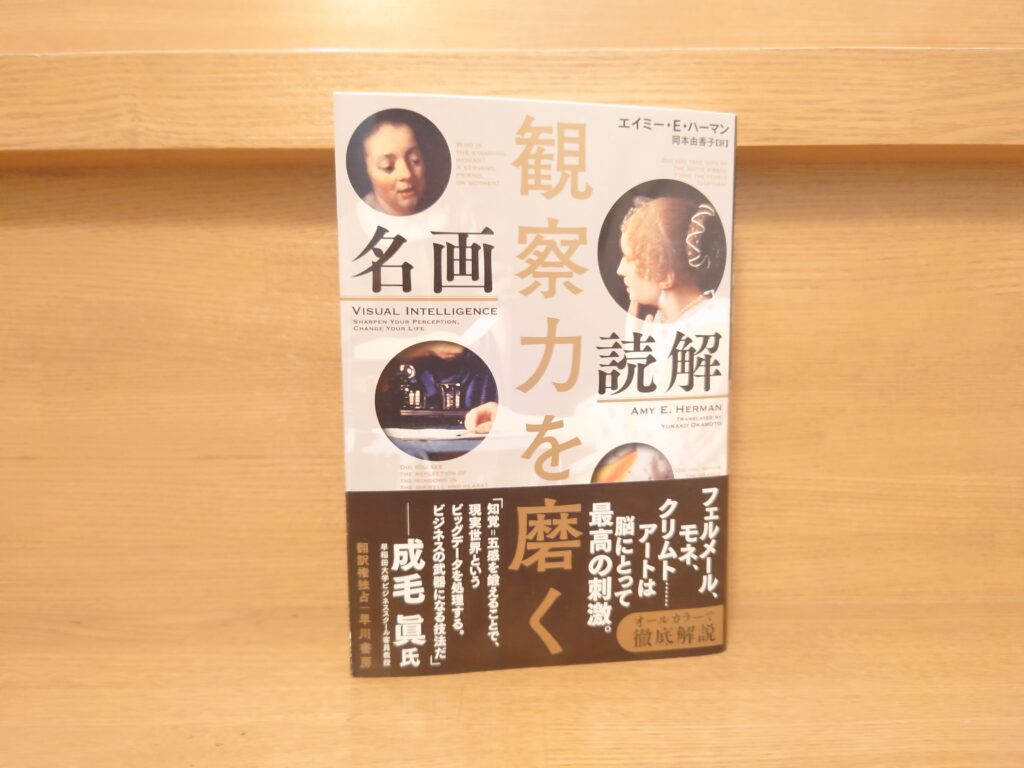
This book is about "using famous paintings as subjects to develop our observational skills and apply them to our daily lives.
Let's learn how to see the paintings."
This in itself is nothing new or unusual. Countless books have been published on the subject. This book, however, is different from those countless books.
Author,
I want to turn your view of the world upside down. Hopefully, you will find color, light, detail, and opportunity in places you never thought possible. You will find life, possibility, and truth in spaces you thought were empty. We will find order and answers in the midst of the greatest chaos of all. And we will never again see the world the way we used to."
'The ability to see what matters makes all the difference in the world. I suspect that by reading this book, you too will realize that you have been living with your eyes closed all your life."
And that is exactly what I say. What I learned in this book is exactly the kind of destructive power that can transform the way we see the world.
Just spending time vaguely thinking, "I'm going to improve my observational skills," is not going to help you acquire them quickly. However, if you continue to observe clearly and consciously, you will certainly change the way you see the world.
I was shocked at how big a difference there was between "seeing" and "watching.
This is an important skill for study, for work, and even for all of life. This is an amazing program that I hope many people will experience.
The term "viewing masterpieces" may sound a little complicated, but rest assured, there will be no such difficult knowledge or philosophical terminology. You will not encounter any such difficult knowledge or philosophical terms. The only question is, "What did you see in the painting? The masterpieces are merely materials to improve your observation skills. There is no problem even if you have no knowledge of painting. In fact, it may be better to have no knowledge at all so that you can view the paintings without any preconceptions.
Please read and practice anyway first.
I highly recommend reading this while you are as young as possible. Because this is"An asset that will last a lifetime."If you know this at age 20, you can live with this observation method for 50 or 60 years. In other words, you have a 30-year advantage over starting at age 50. The difference is enormous.
Of course, it doesn't matter what age you start. It is never too late to start. This is a great book that I recommend to everyone.
3 Shigehiko ToyamaThe Thought Organizer."
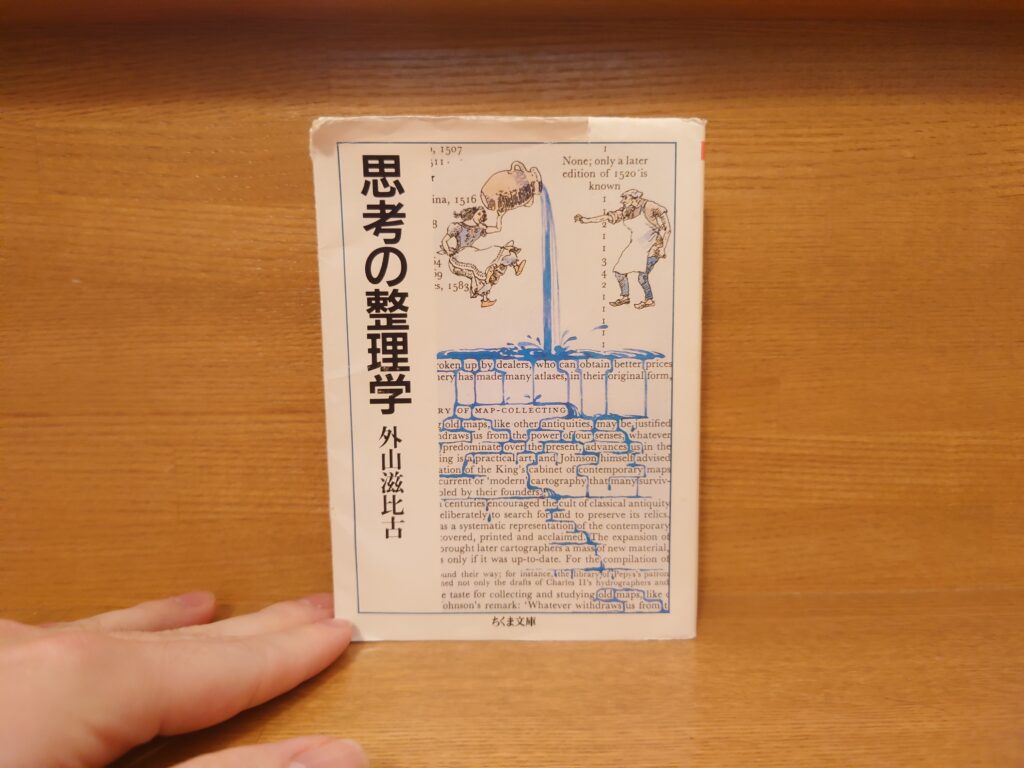
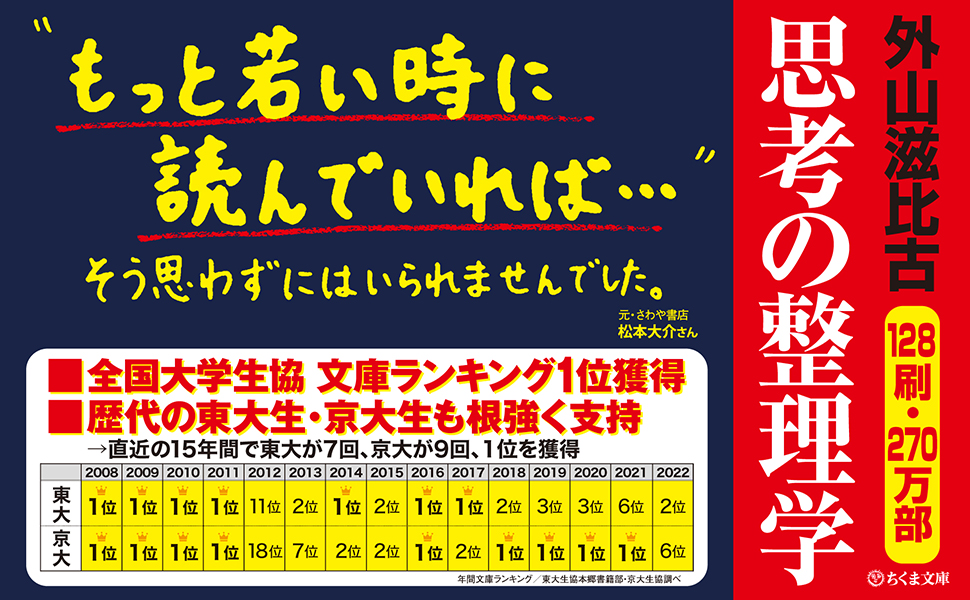
An academic essay filled with tips for thinking for yourself and flying on your own.
AmazonProducts Page.
How can ideas take off lightly and thoughts fly freely in the sky?
This is an excellent introductory book that clearly explains the essence of his unique thinking based on his own experiences.
A book that lets you fully enjoy the pleasure of thinking.
Since it was ranked No. 1 in book sales at the University of Tokyo (Hongo Book Department) and Kyoto University Co-op in 2008, it has been ranked No. 1 in sales seven times for the University of Tokyo and nine times in four consecutive years for Kyoto University. (paperback edition)
It has gained recognition as "the most read book at Todai and Kyoto University" and continues to attract new readers.
As you can see in the book introduction above, this book is an amazing bestseller that has already sold 2.7 million copies. Moreover, it has been well supported by students of the University of Tokyo and Kyoto University, and is a deeply rooted and popular work as an "introductory book for studying.
I remember reading this book when I was a student and was greatly encouraged by it. In this book, the author asks the question, "What is the true meaning of learning? We tend to have an image of "study" as being painful and difficult, but in this book, we can think about why we have to learn in the first place as human beings, and what the true joy of learning is.
In addition, each chapter is compact and very easy to read, making it a perfect introduction to reading.
You may think that studying and reading are rigid and difficult, but this book turns those stereotypes upside down. This book will help you understand the meaning of "learning" and how fun it can be.
I also feel that reading this book has made my reading much more enjoyable. I feel that I am now able to "organize my thoughts" and lead a richer reading life, rather than just reading unnecessarily. Most importantly, I can now read more books with confidence. This book has taught me how to appreciate books and various studies more deeply.
It is a wonderful work that invites us to be active learners rather than passive learners. This is a book I would recommend to all, not just students. Why not pick up a copy?
4 Hidenobu KosaiRhetoric and Sophistry."
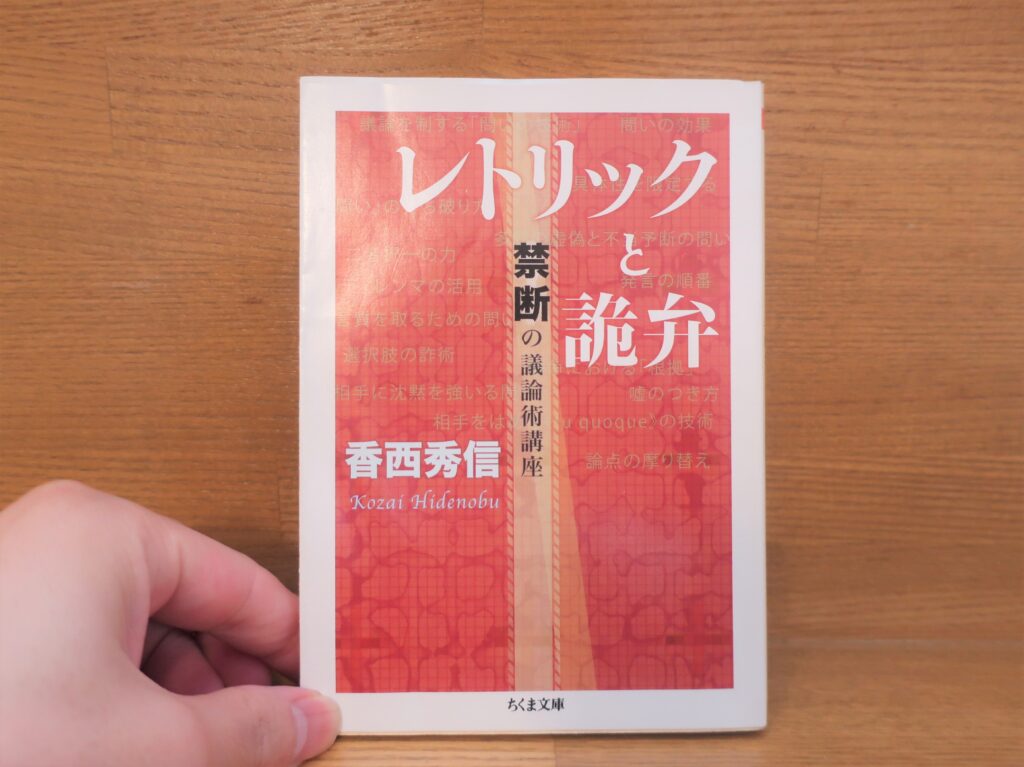
I am sure that there are many people who have had a difficult time being talked down to by someone with a strong mouth.
And sadly, the kinder and more serious a person is, the more he/she is unable to refute the words of the other person and accumulates the pain within him/herself. And worse, they blame themselves, saying, "It's my own fault. In this way, kind and serious people become sicker and sicker. I believe that this is actually happening quite often.
I too have suffered for a long time from the words of a strong-mouthed person. And even when I realized that it was clearly coming from a desire to get at me, I couldn't do anything about it and just blamed myself. The trouble is that people who do such things are often in a clearly stronger position than I am...they try to take advantage of a situation where the other person cannot easily refute them to get at me. This is not a good thing to do when you are losing with your mouth.
In such a world, this book is a wonderful prescription for such suffering.
This book is a very powerful ally in this difficult world to live in.
I still think it is strange to live in a world where the more serious and kind people are, the harder they suffer.
Indeed, this has been repeated endlessly throughout human history. If it is said that this is reality, that is the end of the story.
But, as the author states, there are things we can do. There are things we can practice to protect our own minds. Just knowing that is a great help. I too was saved by this book.
I would highly recommend this book.
5 Barbara N. Horowitz and Kathryn BowersWILDHOOD: The Wild Adolescence

This book is so much fun...!"
This book opens us to a new way of looking at the world.
Why are we so troubled in our youth, and why do we repeatedly act in such a harebrained manner? I am sure that many of us have experienced black history that makes us feel ashamed when we recall it, as well as thoughtless acts that we now find horrifying. The key to why such behavior occurs lies in the fact that we humans are animals, too.
In the commentary to this book.I wonder if it would be possible to create a moment when your gaze, which has been focused only on your feet, would suddenly look up toward the sky. You might get a moment to quiet your mind, even if it's just for a breath."As he said, "This book gives me a sense of distance and objectivity toward myself as a person.
This is a work that should be read by young people. It is during adolescence and young adulthood that we encounter and worry about many things, and it is also the time when we are searching for ourselves. Reading this book at such a sensitive time is very significant in terms of confronting oneself.
This book is also highly recommended for those involved in education and for parents who are raising children. When you have the perspective that humans are also animals, it will change the way you see the world.
Well - it was a wonderful book! This is interesting! This is a great book that you should definitely pick up!
6 Hideo KobayashiOn Reading."
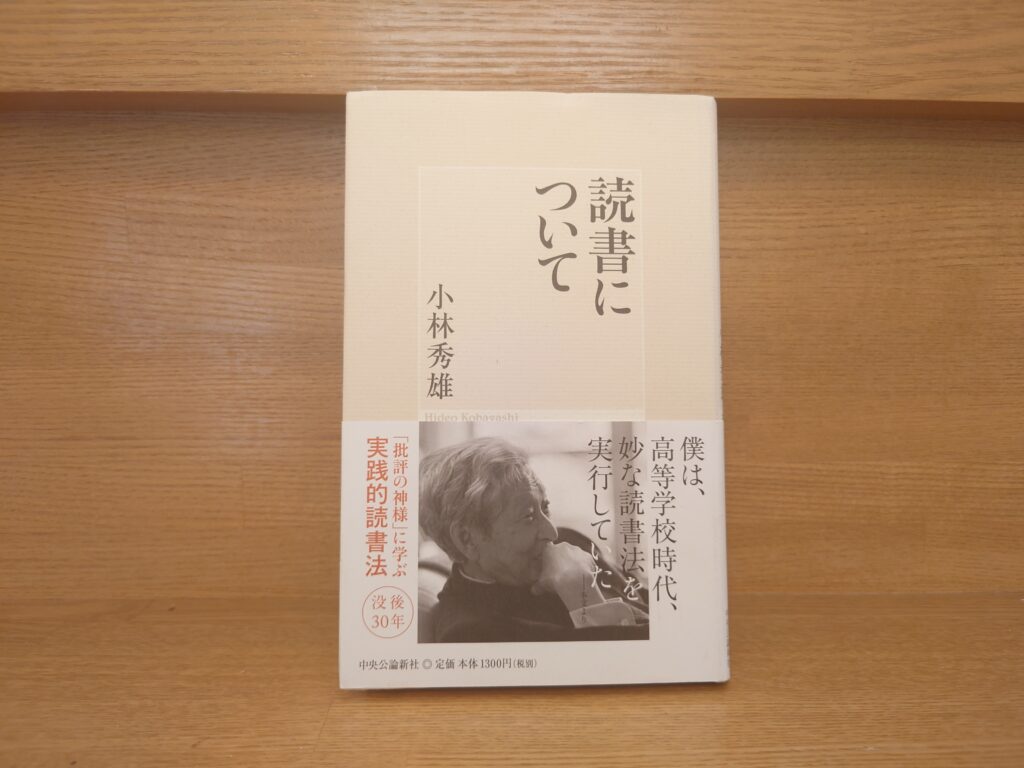
Hideo Kobayashi was a literary figure active in the Showa period and is known as the "God of Criticism.
This book, "On Reading" is a collection of essays written by Hideo Kobayashi about reading.
I was struck by the following words of his. It is a bit long, but I will quote it here.
It is very good to read the complete works of a writer. (The source of pleasure in reading is always the phrase, "A sentence is a person," and the quickest and surest way to understand the deeper meaning of this phrase is to read the complete works of a writer.
Any top-notch author is fine, just pick one you like. If he/she is too prolific, it will be a nuisance, so just pick one reasonable one. Read his or her complete works from cover to cover, including diaries and letters. (Omitted).
I am not speaking theoretically, but rather from experience, and it is through my groping that I come to know the author, not through an introduction from someone else. In this way, in a dimly lit place, once I have come to know the author, I can no longer distinguish between a masterpiece and a failure, and I can feel the whole person of the author in even a single word.
This is the true meaning of the phrase "the letter is the person. It means that the sentence is in front of the eye and the person is in the back.
On Reading," Kobayashi Hideo, Chuokoron Shinsha, 2018, 5th edition, p. 11-13.
Through a person's words, you can see the person himself/herself - that is the true joy of reading.
Ah, Hideo Kobayashi indeed! How it makes my heart tremble!
It takes a great deal of time and effort for a book to become visible as the person who wrote it, and not as the book itself. There is no other way to return what has come out of a human being and become a text to a human being, and there is no other way to do this than through the art of reading.
On Reading" Kobayashi Hideo, published by Chuokoron Shinsha, 2018, 5th edition, p. 13
The book doesn't look like a book..!
Oh, I didn't know there was such a boundary...
I am more devoted to reading because of these words of Hideo Kobayashi.
This book is also a very valuable insight into what it means to read a book. I highly recommend it.
7 Reggie, "Fast Cultivation: People Who Want Answers in 10 Minutes."
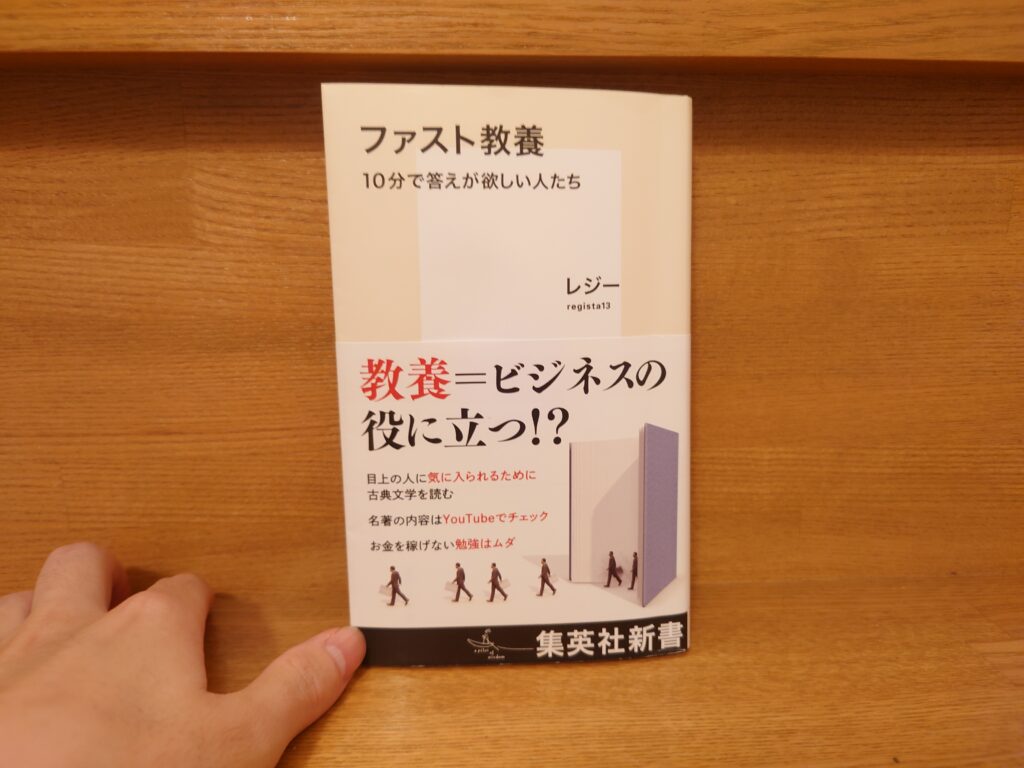
The stifling effect of "culture = useful for business."
AmazonProducts Page.
Reading the classics to improve social skills, checking out the contents of great books on YouTube, learning financial techniques and argumentation skills from influencers to increase "self-worth" - this kind of "culture theory" is gaining popularity among businesspeople.
The author, who works as a writer while working for a general company, named this situation "fast culture.
YouTubers who incorporate and transmit stimuli into their "culture," entrepreneurs who say "earning money is winning," charismatics who preach "skill improvement," politicians who preach "self-responsibility," and commentators who easily classify others as "idiots" ......2000s and beyond. This report analyzes the discourse that has been supported by business people since the 2000s and reveals the true nature of the "suffocating" feeling that pervades society.
This book is not simply a work written to criticize influencers including Hiroyuki, Atsuhiko Nakata, Kazu Laser, DaiGo, Yusaku Maezawa, and Takafumi Horie (from this book).
Rather, the work carefully follows the mechanisms of modern society as to why we are attracted to such influencers.
As you will see in this book, "Fast Education" is all about how quickly you can ingest something useful for your business. Fast Education" makes sense as a strategy to help you survive the competition.
The process of carefully considering various possibilities and positions is abandoned, and they are forced to compete for survival according to their own rational thinking (as they see it). However, I highly doubt that this kind of learning is good for the world. As the author says
What is missing in fast culture
In this chapter, we have discussed the inevitability of the widespread support for the concept of fast education, which focuses on how individuals can earn money and survive. While there have been many hit titles in the so-called business and self-help book genres in the past, fast-education, which accelerates based on self-responsibility, is a phenomenon created by the overall trend in Japanese society since the beginning of the 21st century. And this momentum is likely to continue for some time to come.
I have introduced a number of key players in this debate, and one of the major common threads is their "divergence from the public sphere. They emphasize individual survival as if they reject the model of a society where people support each other as annoying. The reason why Horie, Hashimoto, and Hiroyuki all advocate the introduction of a basic income system is because the "I'll give you a certain amount of money, and you can handle the rest" approach is compatible with their strong individualistic ideology. In addition, neither Atsuhiko Nakata nor DaiGo seem to be willing to give back to society as a whole or to the weak.
In his book "Lifehack, Reward Exploitation, Individualism...The 'Inconvenient Thinking' of 'NewsPicks-kei' People" (Bungeishunju digjtal), Takesato Fujisaki, a critic and part-time lecturer at the Saitama Institute of Technology, writes In his book, "Lifehack, Exploitation of Rewards, Individualism...," he described the common attitude of the people discussed in this chapter as "individualism without a concept of responsibility," including the idea of attributing everything to individual efforts and the attitude of considering everything in society from a business perspective ("Even laws and regulations that are designed to provide minimal fairness are a bump on the eye from a business perspective").
There is nothing to blame for making an effort to learn something. A society in which the results of one's efforts are steadily returned to the individual in the form of monetary compensation is a desirable state of affairs. It is a correct strategy to focus one's study on skills that are needed in the world in order to produce results. It is only natural that we should aim for an efficient way to advance our skills, and sometimes it may be necessary to take risks and challenge ourselves to go beyond the rules.
However, efforts focused on "self-survival" make people look at those around them coldly. In addition, although "learning" by nature is usually a state in which "the more you know, the more you don't know," it is inevitably difficult to feel such an atmosphere in places surrounding fast education. Nakata's reaction to the discussion between Atsuhiko Nakata and Takumi Yobinori, who runs a YouTube channel called "Yobinori," a Japanese word for "college math and physics" (yobinori), in the book "Study Dokugaku no Neri Dake Dokugaku no Shiroku" (A Textbook for Self-Study That Makes Learning Fun) is symbolic of this.
rice paddy field in the middle of a fieldWhat percentage of the total is there that you don't know right now?
meansI think it's about 0.001 percent of what we know, in terms of sensory perception.
rice paddy field in the middle of a field: eh? Less ....... I was under the impression that you knew more.The way of learning, in which one gains a sense of omnipotence by acquiring knowledge and gaining confidence in one's own survival while feeling superior to others, seems childish in any way. The "simple decision" that Horie and Hashimoto often emphasize should become more difficult the more one learns. However, what lies ahead of the fast-educated worldview is a society where only "simple decisions" required in business situations are favored in all situations, without fostering fear of the unknown, consideration for exceptional events, and imagination and compassion for people in different positions. What do the people named in this book think about such a society that may be formed in the future? Do they express their true feelings of "I don't care about society" based on their confidence that they can survive no matter what? And will those who feel sympathy for their values internalize such ideas as "self-responsibility," "skill development," and "separation from the public" (while being tormented by the fear that one day they may drop out) and move forward to become someone else?
While there are those who would be fine with such a stance, I would like to take the position that such a society is indeed unbalanced. In this book, I would like to take the position that such a society lacks balance. While affirming at a certain level the fast-education way of learning, in which people use their education to improve their own skills, we would like to examine the ideal form of education for the next era, including an eye toward society and dignity.
Shueisha, Reggie, Fast Cultivation: People Who Want Answers in 10 Minutes, p123-126.
I feel a great threat if the "fast culture" worldview continues to infest Japan.
Now a "new dangerous cult" could be born at any time. In my opinion, the influencer's methods of attracting customers are similar to those of a cult.
They are willing to say radical things, assert themselves confidently, and argue polemically. And they skillfully create enemies, abuse their opponents, and make them think they are righteous.
The only thing wrong with you is a society that doesn't understand you. But if you follow me, you will succeed. It is your enemies who are to blame, who treat you with disrespect. Do as I say.I'm going to try.You are a wonderful human being."
Then Oyasama takes away the will and initiative of the believers. The believers think they are doing it of their own volition. But what is the reality?
I cannot talk more about cults here because it would be a digression, but I would like to note again that the soil in which "fast culture" is prevalent is closely connected to it.
Learning and reading are important. However, we must not forget that there are people who take advantage of our willingness to learn. I believe that this book is an essential work for living in modern Japan. I highly recommend this book.
8 FranklNight and Fog.
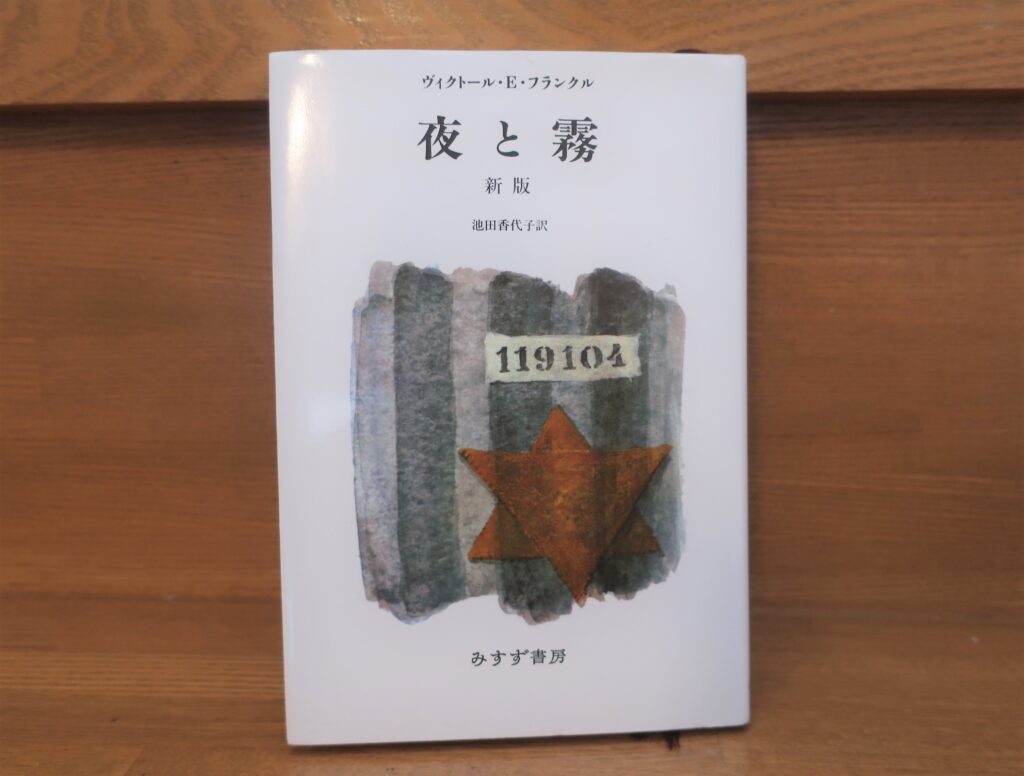
The work is the psychologist Frankl's account of his experiences at Auschwitz and the Dachau camp in Munich.
Night and Fog" is one of the most famous and well-known books in the world. I first read this book when I was a student. I still remember the shock I felt when I first read it.
It was those reading experiences that led me to visit Auschwitz in 2019.
The fear I felt there was also unforgettable. In particular, the feelings I had when I entered the gas chamber are still vivid in my mind.
Why did the Holocaust happen and what was happening there? What is the mechanism of mass murder of people?
To study history is to study the present. We must not look away, even if it is painful, in order to prevent that history from repeating itself.
In this blog, we introduce books that can help you learn about the tragic history of these wars. Please refer to the following category page for a summary of these books.
.A History of the Soviet Union in the Lenin-Stalin Era."
."The Russo-German War: The Soviet Union and the Nazis' War of Extermination."
.Stalin and Hitler's Genocide/Holocaust."
9 Hinomiya MadokaThe Composer's Tale Series.(now in the "Biographies of Musicians: A Book to Read at the Beginning" series)
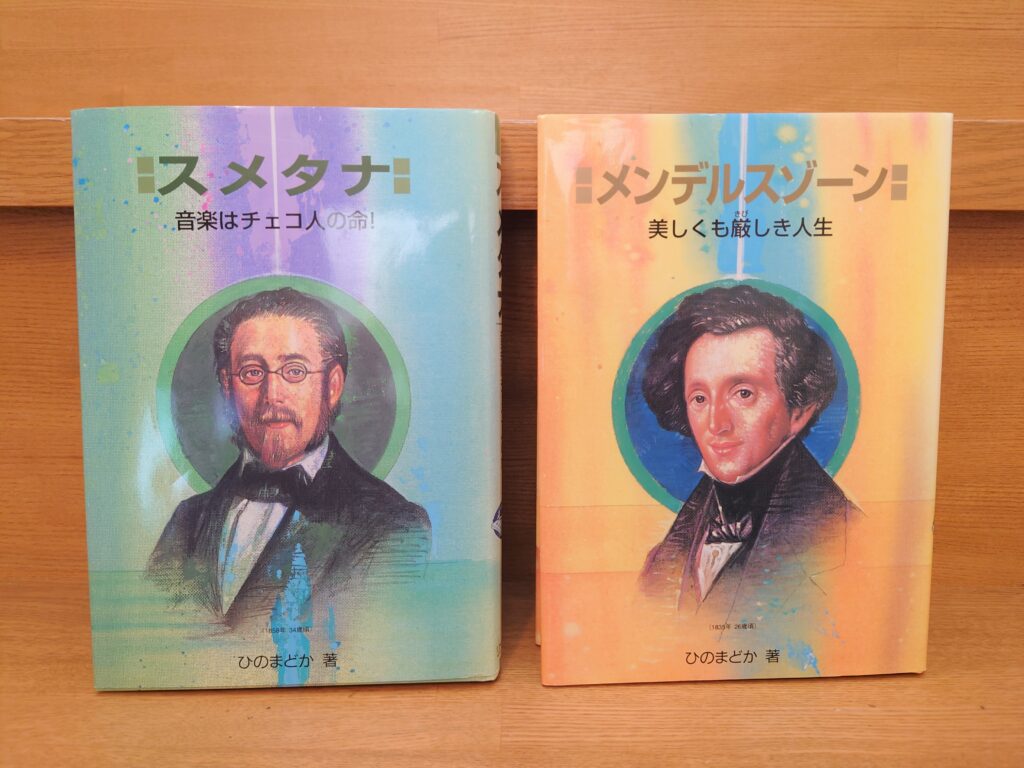
Although this series was written as a children's book, I believe it will resonate with people of all ages.
Conversely, how great an experience it is to be able to read books in childhood that move even adults.
As you will see when you read the books, this series is not written in a child-friendly manner. The language is such that it really speaks to "one person". We do not treat them as children just because they are children's books.
And that's not all, I felt strongly about this series when I read it.The Wonder of Biography."It is.
The biography includesThe way a person lives and dies in a certain time and society.will be depicted realistically.
I am convinced that there is much more to learn through the lives and deaths of great people than we can imagine.
The circumstances in which the great men were placed were full of difficulties and tumultuous events followed one after another.
Sometimes they are geniuses and thus go on to their own destruction, and other times, they persevere and work hard in the face of adversity, and through hardship, they find success.
And then you run into sudden illness or the death of a loved one.
What we notice when we read biographies from the 18th and 19th century is that there is a lot of illness and death anyway. We are also faced with the suffering of composers who lost many of their precious children.
To be able to learn about the lives of great people of such an extraordinary scale, witnessing both their glory and their suffering.
In addition, by learning about the background and history of the times in which they lived, we can think about what the modern world we live in is like.
I think this is the great thing about biographies.
It is also important to put a lot of knowledge in your head. There is no doubt about that.
butHow Great Men Lived and Died."From,
Then what does it mean for us to live?"
What is my way of life?"
What will my death be like?"
What kind of life, what kind of death do I want?
What would the people of the future think if they saw our world today? What would people in the future think if they saw our world?
I think it is also important to think carefully about such things as
I believe that biographies can teach us about this.
Biographies allow us to see all the joys, sorrows, and anguish of these great people.
I hope you will be able to see how these great people "lived" and "died" and feel something from them.
And as a superlative biography I recommend Hinomadoka's "Biography Series"!
And please read the whole book. The more you read, the more you will appreciate it. The more you read, the more you will enjoy the book. The lives of various composers are crossing each other, and you will start to see more and more of the world after the 18th century.
This kind of reading experience is rare. I assure you this.
Currently, a new edition of this biography series, "Biographies of Musicians A Book to Read at the Beginning," is being published in a series of books. Among themBiography of a Musician: An Introduction by Fumio Koizumi.is the first book in the series to feature a Japanese musician, and we highly recommend it.
Fumio Koizumi, the charming protagonist, and his adventures in musical exploration that take him all over the world. The world, historical backgrounds, cultures, and interesting aspects of music that he sees appear before your eyes as if you are watching a movie.
What particularly impressed me about this book was the story of Fumio Koizumi in India, where he studied for his music research.
I am a monk, so I am still quite interested in India. However, I have not been there yet, and I was hoping to visit as soon as possible after the Corona disaster is over.
I was still struck by the image of Fumio Koizumi, who devoted himself to music research in India.
He has a broad perspective and an uncommon inquisitive mind to learn about various music and cultures from all over the world. He also has the ability as an educator to convey this information in an easy-to-understand and enjoyable way.
I was just amazed that such an amazing person existed in Japan.
We encourage you to pick up a copy for an entrance into this series.
10 Tadayen, Tannisho
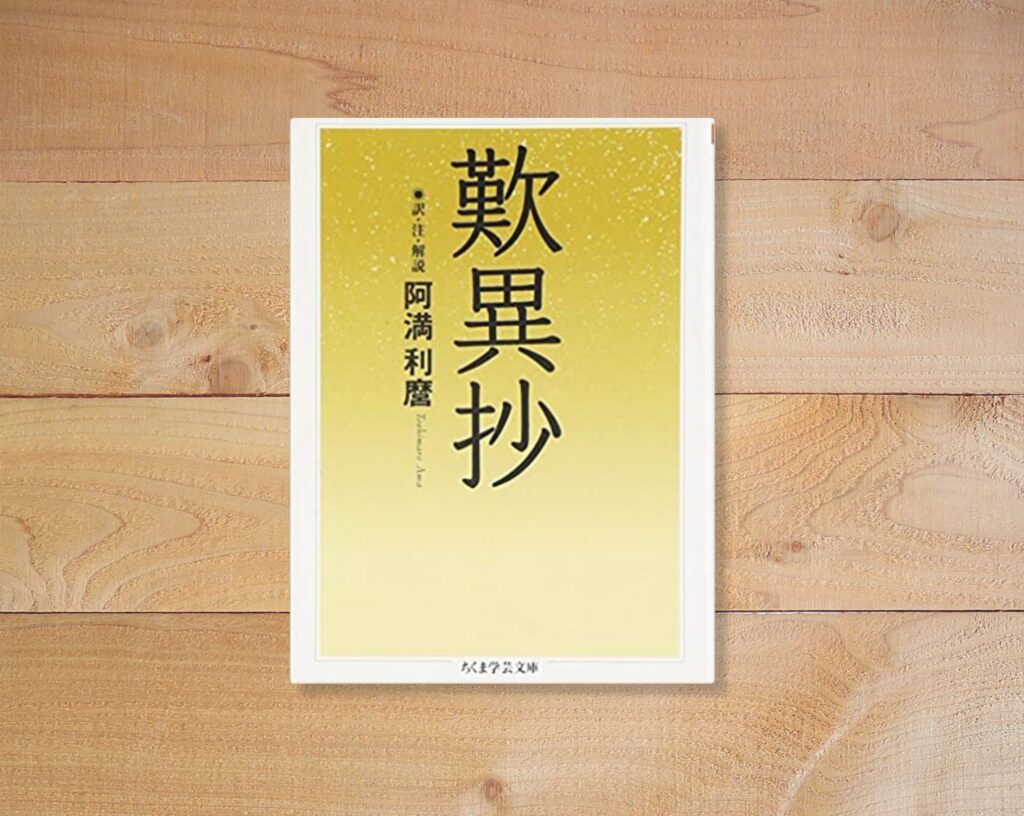
Finally, the tenth and final book on Buddhism has appeared. You may have wondered why there were no Buddhist books in the "Recommended by Monks" section. Furthermore, this "Tannisho" is not a work that will directly help you in your real life. It is not a book that says, "Read this and you will live better.
But the reason why I introduce this book here is because "Tannisho" is "a tremendous work that, although not directly useful in real life, has a profound impact on the way we look at things.
The protagonist of "Tannisho" is the author of this book, Yui En. He is a disciple of Shinran Shonin, the founder of Jodo Shinshu.
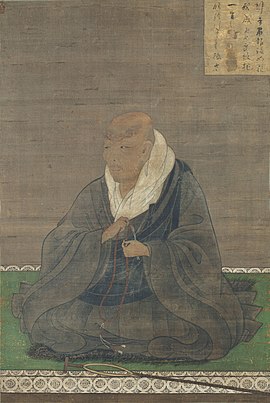
In "Tannisho", we can read about this dialogue between Shinran and Yui En. And Shinran's words in this dialogue are just amazing!
Have you ever heard of it? It's the word ""the" word.
This is Shinran's famous philosophy called "Kyojin Shokichi Setsu," which is the shocking teaching that since good people can be saved, there is no doubt that even evil people can be saved.
This is a seemingly insane teaching, but in fact, it has a deeper meaning. Shinran was not simply saying that even bad people can be saved.
Tannisho" is a work that has had a huge influence on Japanese thought. All intellectuals since the Meiji era have read this book.
Tannisho" has tremendous power, so to speak, as a huge bomb in Japanese thought.
Although the words themselves are from the Kamakura period (1185-1333), they are not that difficult to understand. Many modern translations of the text have been published, so it would be a good idea to read that first. In any case, I think it will be a great experience for you to experience the strong ideas that have been created by Japanese culture. This is not to say that reading this book will be immediately useful in society. However, as a human being, it is a great opportunity to deeply question the very nature of human beings when you encounter such powerful ideas. As a Buddhist monk, I highly recommend this book to everyone.
Of course, there are many Buddhist books that can provide us with food for daily living. Buddhism teaches many teachings that calm the mind and guide us in life. There are many books that I recommend. However, I would like to introduce "Tannisho" to you here because I would like to give it a shot of dynamite to you students. To be honest, you don't have to try to understand the contents. I would like you to experience firsthand that there is a person who is saying such things. This experience may someday be connected to something else. The depth of your life will completely change depending on whether or not you have that experience.
Due to the schedule of blog updates, I have not yet been able to introduce "Tannisho" itself, but I highly recommend this book.
Conclusion
In this article, we talked about "10 books to recommend to students," and in addition to this, the following article about recommended novels"24 novels recommended by a book-loving monk - a quick rundown of recommended works at each level, from beginner to advanced!"We hope that you will also refer to the following pages.
The books introduced in this issue will surely help you. Please feel cheated and read them first. I often hear that people are turning away from books these days, and that is a real waste of time. I will talk about why it is important to read books in another article later, but I am confident in recommending at least the books I have introduced here.
We hope you will read and utilize these books.
These are the 10 books that a book-loving monk seriously recommends to students - Reading is always a power! This is the end of the article.
Next Article.
Related Articles





































